Rugby World Cup: Rugby to blossom for 2019 World Cup hosts Japan
- Published
After its strong showing this year, Japan is already looking forward to hosting the 2019 Rugby World Cup
Japan will know this weekend whether they have upset the Rugby World Cup odds once again, and qualified for the quarter-finals for the first time.
However, even if that proves a step too far for the Brave Blossoms, they have already made history with the greatest upset at a Rugby World Cup - their stunning victory over 1995 and 2007 champions South Africa.
The Asian underdogs' results since then may not have matched that peak, but rugby union in the country is now on a popular high, and there is a new appetite and interest in the game that bodes well for Japan's hosting of the competition in 2019.
What has been a niche interest has found itself catapulted into the national consciousness, while last week global governing body World Rugby approved a revised tournament plan for 2019, one brought about by issues over where the final would be played in four years' time.
After delays around building a new Olympic Stadium for 2020, which Japan is also hosting, World Rugby has said the 70,000-seat Yokohama Stadium (venue for the 2002 football World Cup final) will host the final of the 2019 rugby competition.
Getting hooked
One Japanese business expert, and keen amateur rugby player, believes that the tournament, the first ever to be played in Asia, will provide breakthrough moments for both the sport and the nation.
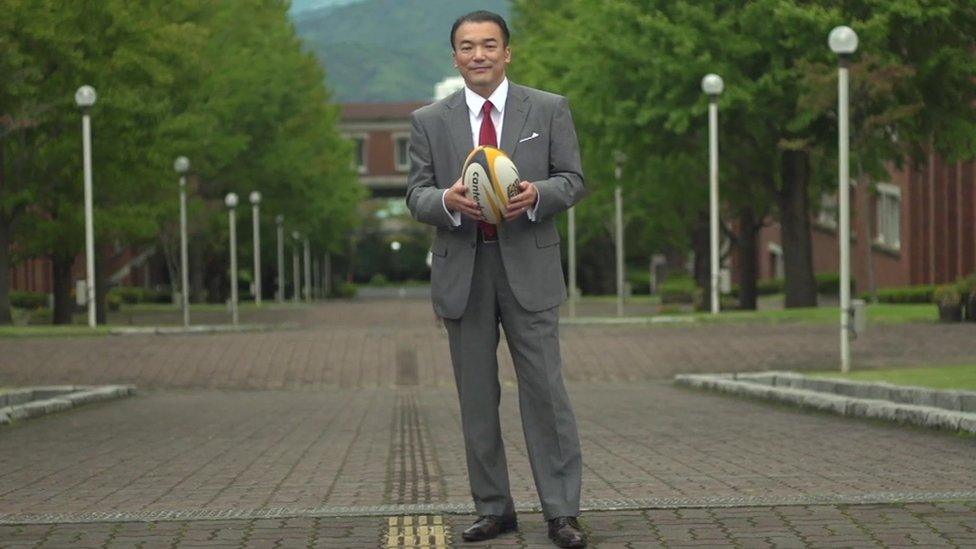
Prof Takeshita is spreading the word about rugby union in Japan
"In Japan, rugby is not really fully recognised," says Seijiro Takeshita, professor of management and information at the University of Shizuoka, and former captain of the London Japanese Rugby Football Club.
"It is also a pretty difficult game to understand, so I think more recognition of the game would definitely boost the population of people who are going to look into the game. Once they do, they will get hooked."
There was an immediate upturn of interest after the South Africa victory, with nearly 20 million Japanese watching the team's second Rugby World Cup match against Scotland, their first following the stunning upset.
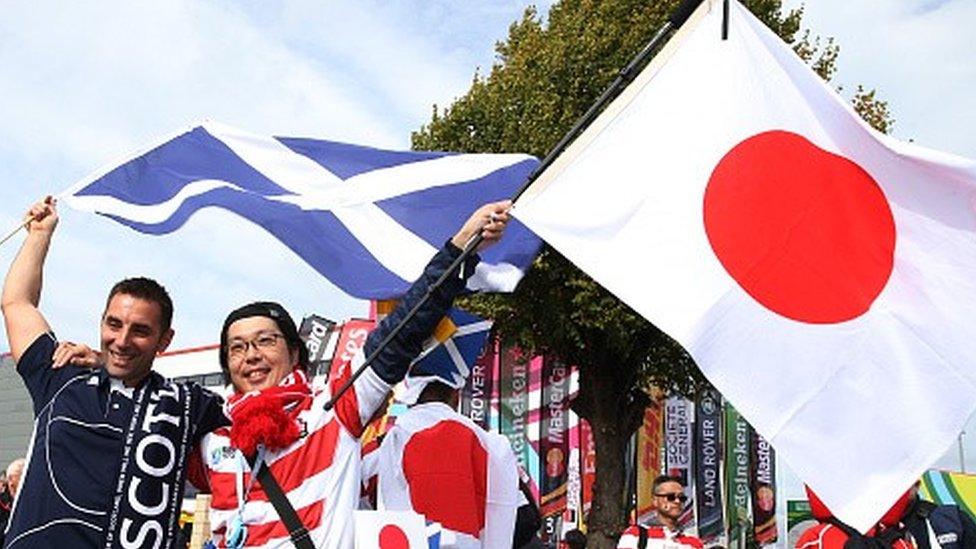
Japan fans have been making rugby friends during their team's 2015 games
The Scotland match started at 22:15 Japan time and 19.5 million people, some 15% of the population, stayed up to watch.
"I think [the South Africa victory] had an astonishing mega-effect, both outside and in Japan," says Prof Takeshita. "That showed to the world that we can do this. Right now nobody argues that Japan will be hosting the World Cup in 2019."
Business with leisure
Prof Takeshita says Japan has already eyed increased tourism as a major target for the economy and that the 2019 World Cup can "certainly give a very strong following wind to that trend, and also recognition that Japan could hold such a big event".
"It would also be a very big advertisement [for Japan] to the rest of the world, so it works very nicely inside and outside of Japan, and I do feel that Japan will make a very good host," he adds.
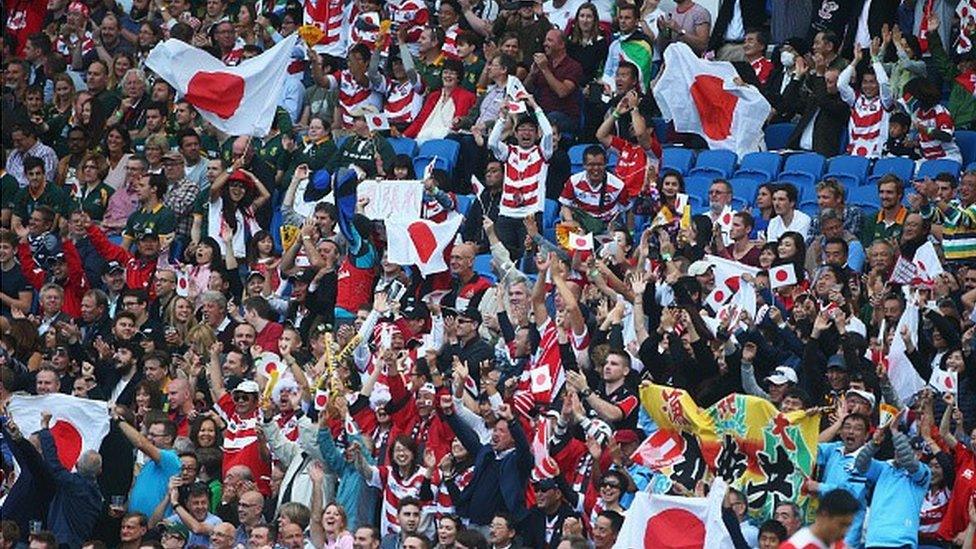
The Rugby World Cup has heightened awareness of the sport in Japan
"Japan is known for its articulate and precise level of, for example, transportation, service, what have you... it is a very business-like community, and I think it a very good opportunity to show to the world that we can do this really, really well.
"It is also an opportunity for Japan to appeal to the world, that this isn't just business, but this is a wonderful place for leisure as well, and you can mix both of them together."
He said that Japan was still not "fully understood" by the rest of the world. "I think this is a very good opportunity for Japan to show that it is not only on the operations side that we can do it, but that the country is a very strong attraction for you to come back to many times later on."
Touch rugby
Koji Tokumasu is general manager of the Japan 2019 Rugby World Cup Organising Committee and has been a fan of rugby since he fell in love with the game while studying in Cardiff.
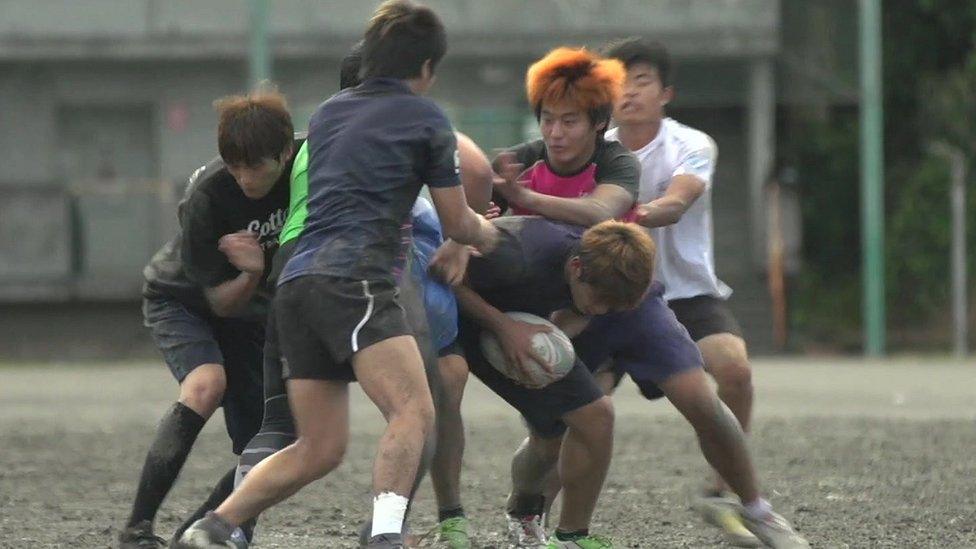
Rugby in Japan is currently focussed on colleges and corporate-affiliated teams
He sees the 2019 World Cup expanding the Japanese rugby participation base - currently focussed on colleges and corporate-affiliated teams - out into the wider sporting public.
He says the host cities will be key in promoting the game, through their schools, civic events, and local government support.
"We are making use of about 20,000 primary schools, and bringing tag [touch] rugby, non-tackling, which the boys and girls can enjoy," he adds. "So by the year 2019, every single child will have touched the ball."
He also said that whereas the 2020 Olympic Games would be held in one city - Tokyo, the Rugby World Cup could bring economic benefits to a number of cities and towns across Japan.
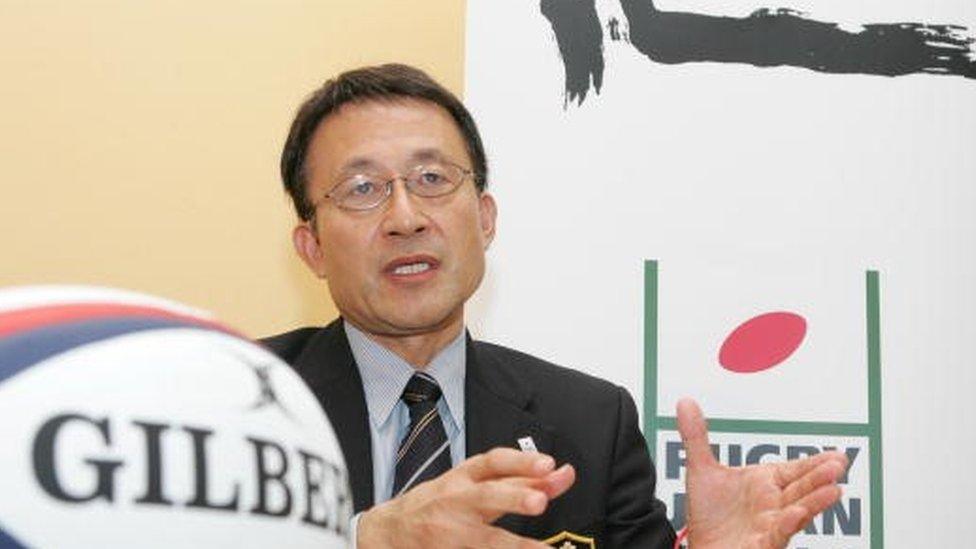
Koji Takumasu became a fan of rugby when he studied in Wales
He said as well as the 12 host cities, there would be another 20 training camps, meaning tourist visitors would be visiting a number of communities during the six-week event.
Rugby mission
And Mr Tokumasu says that despite the stadium hiccups, the country will deliver a successful Rugby World Cup.
"Of course Japan Rugby is confident to deliver a successful World Cup," he says. "The reason why World Rugby has given us an opportunity to host the World Cup is that rugby should be played outside the traditional unions, such as England, Australia, and South Africa.

Mr Tokumasu says Japan's 2019 hosting will promote rugby union in Asia and beyond
"Whenever you have a major event you always have some issues in between, from the beginning to the end... and in the end we [will] just look back and say 'sometimes we had such an issue, but let's enjoy the tournament'."
He adds: "Asia has 60% of the world population, and we really want to make sure the Rugby World Cup in Japan 2019 will contribute to the develop of rugby in Asia, and eventually into the world.
"We have a special mission to make rugby a truly global sport, and that was the very reason we were chosen to host. And we are going to complete our mission."
Read more about the Business of Rugby here.